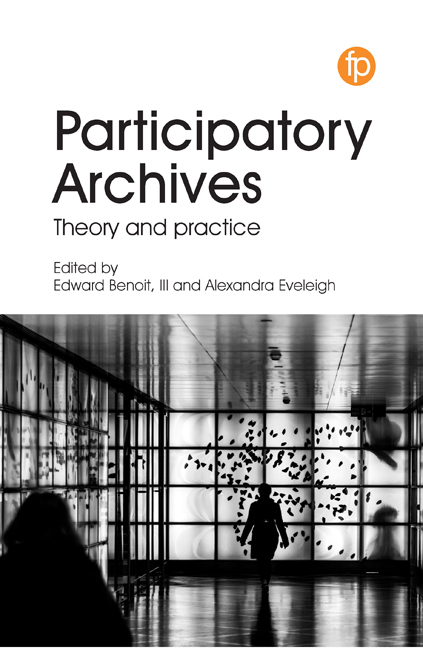1 - Defining and framing participatory archives in archival science
Published online by Cambridge University Press: 25 October 2019
Summary
The rise of Web 2.0 over the past decade has fostered the growth of participatory and do-it-yourself culture. Likewise, the archival community leveraged these new technologies, aiming to engage users and expand access to collections. This includes, but is not limited to, social tagging and commenting, crowdsourced transcription and crowdfunding models. This edited book aims to examine the development of participatory archives, its impact on archival theory, and present case studies of its real-world application.
This introduction contextualises the individual chapters within archival theory, research and practice. The chapter begins with a discussion of the definitions of participatory archives from its analogue origins to its contem - porary use. The subsequent section explores the theoretical roots of the participatory movement, its intersections with other archival movements, and its benefits within the archival endeavour. The final section describes the structure of the book and introduces the individual authors and topics.
Defining participatory archives
Many commentators – including the editors and contributors to this book – choose to make a connection between participatory archives and the development of online technologies over the first two decades of the new millennium: an attempt, perhaps, to assert archives’ continuing relevance for a social media generation. Web 2.0 has certainly contributed to the popularity of participatory archives by facilitating asynchronous interactions between archivists and users and obviating the need for each party to be physically co-located, at least in theory. In practice, there are still cultural and language limits to the internet's reach even across developed countries, as some of our case studies demonstrate.
But though the tools of communication belong to the 21st century, participatory practice is invariably informed and shaped by traditions of antiquarian collecting and ‘serious leisure’ research activity, volunteering in archives, and an abundance of archive-focused communities of practice and group organisational endeavour – members’ societies set up to research or collect together records relevant to a topic of mutual interest, family history collectives indexing sources by personal name and friends of the archives groups fundraising through accumulated small donations. The contemporary examples of participatory archives documented in this book all draw on precedents from the analogue era, some of which significantly predate the establishment of the archives profession.
- Type
- Chapter
- Information
- Participatory Archives , pp. 1 - 12Publisher: FacetPrint publication year: 2019
- 2
- Cited by



